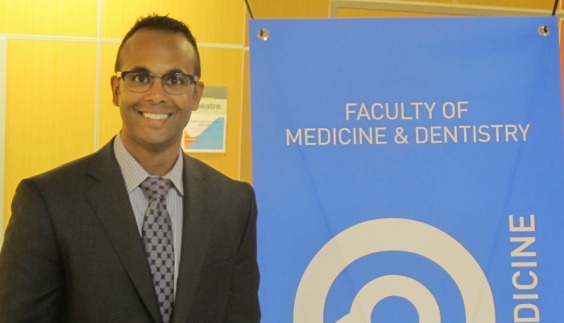
Jeevan Nagendran
Jeevan Nagendran, a PhD student in the Faculty of Medicine & Dentistry, is the winner of the prestigious C. Walton Lillehei Resident Forum award for 2013. The award was given for the best resident research presentation at the annual meeting of the American Association for Thoracic Surgery in Minneapolis.
"This is certainly the most prestigious cardiac surgery resident award in the world and Jeevan brings great credit to Edmonton with his work," says David Ross, divisional director for the Division of Cardiac Surgery and a member of Nagendran's PhD committee.
Nagendran's research in the lab of Faculty member Jason Dyck examines what happens in the heart when blood flow is restricted (ischemia) and restored (reperfusion). He explains that the heart predominantly uses two fuel sources: fat and sugar. During ischemia and reperfusion, the heart uses significantly more fat than sugar as its energy source.
"We believe this is a maladaptive response," says Nagendran. "So we have tried to block the heart's ability to take fat into the cell by knocking out the main fatty acid transporter: CD36. We found that the decrease in fat uptake helps the heart function better after an ischemia and reperfusion injury. Contractile function is normally severely decreased after ischemia and reperfusion because the heart is damaged and does not pump as well as it should. When we block CD36, the heart demonstrates improved function. This is not a return to normal function but certainly better than a heart with unaltered CD36 activity."
Ischemia reperfusion injuries mainly occur during revascularization procedures to restore blood supply and during transplantation of donor hearts. Finding ways to deliver CD36 inhibitor in the future could represent a way to help the patients heart function following these procedures.
Nagendran graduated from medical school at the U of A in 2006. He then completed four years of his residency in cardiac surgery before taking a three-year break to do a PhD. He will defend his thesis on May 31 and will then return to complete the last year of his residency. Once Nagendran finishes his PhD and residency he plans to do a subspecialty cardiac surgery fellowship to further enhance his training and then hopes to stay in Alberta to practise.
"As cardiac surgery residents in Canada all we ever want is to operate on Canadians. Practising anywhere in Canada is the main goal, but I would love to stay in Alberta," says Nagendran who was born and raised in Edmonton and completed his undergraduate degree in chemical engineering in 2002 at the U of A.
"I was always fascinated by physics and mechanics, and that interest, combined with a heart surgeon for an older brother, directed me towards this career path," he explains when asked what took him from engineering to cardiac surgery and award-winning cardiovascular research.
Nagendran's research is funded by Alberta Innovates - Health Solutions and the Canadian Diabetes Association. The project he worked on in Jason Dyck's lab receives support from the Canadian Institutes of Health Research.